Newborn skin is incredibly delicate, and not all baby wipes are created equal. Backed by pediatric dermatology research, this guide helps you choose the safest wipes and avoid ingredients that could irritate your baby’s skin.
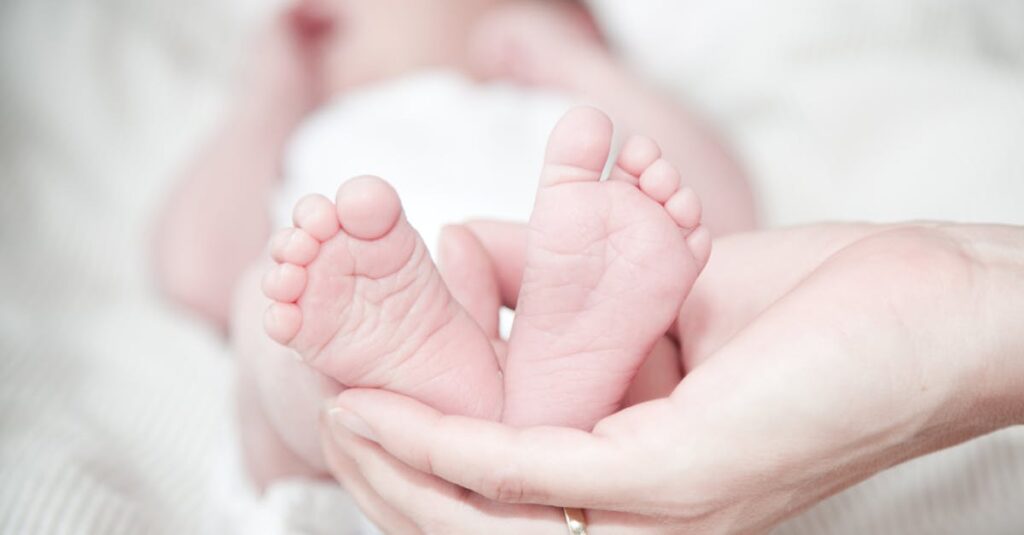
Baby wipes are a daily essential for most new parents, but when it comes to newborns, it’s natural to wonder if they’re truly safe. While some wipes are gentle enough for a baby’s first days, others contain ingredients that may irritate sensitive skin. In this article, we’ll walk you through what the research says, what to avoid, and how to find wipes that are both convenient and newborn-safe.
? Looking for product recommendations? Check out our Best Baby Wipes for Newborns (2025) guide, featuring top pediatrician-approved options.
Can You Use Baby Wipes on a Newborn?
Yes, baby wipes can be safe for newborns, but only if you choose the right kind. A newborn’s skin is thinner and more sensitive than an older baby’s, which means it’s more prone to irritation, especially in the diaper area.
According to pediatric dermatology experts, the safety of baby wipes is carefully evaluated based on both individual ingredients and the overall formulation. Most high-quality baby wipes undergo human subject testing to make sure they’re safe, even for delicate newborn skin.
(Source: Diaper Dermatitis: Current Consensus, 2023)
Most pediatricians recommend using fragrance-free, water-based wipes in the first weeks. Some hospitals even use water wipes in their newborn wards. However, if your baby was born prematurely or has very sensitive skin, plain warm water and a soft cloth may be recommended initially, especially in the first 1–2 weeks for very preterm infants.
Are Baby Wipes Better Than Water and Cloth?
Several clinical studies, including a 2018 review published in Global Pediatric Health, have shown that modern, well-formulated baby wipes are just as safe, or even gentler, than water and cloth when it comes to cleaning newborn skin. High-quality wipes may better support healthy skin pH, reduce redness, and help maintain the skin’s natural barrier, especially in the diaper area.
These benefits were seen even in preterm infants (after the first couple of weeks or if born after 29 weeks gestation), where wipes led to less skin irritation and better skin protection than water and gauze. To ensure safety and effectiveness, choose wipes that are fragrance-free, alcohol-free, mildly acidic, and contain gentle cleansers and emollients.
✅ What to Look For in Wipes for Newborns
When shopping for wipes that are safe for newborns, look for:
1. 99%+ Water-Based Formula
Wipes that are mostly water are the gentlest option for a newborn’s sensitive skin. Fewer ingredients mean there’s less chance of irritation or allergic reaction.
2. Fragrance-Free
Fragrance-free wipes don’t contain any added scent ingredients—natural or synthetic—which makes them a safer choice for babies with sensitive skin. “Unscented” wipes may still include masking agents to hide the smell of other ingredients, so always check the label.
3. Hypoallergenic and dermatologist-tested
These labels mean the wipes have been tested to lower the chance of allergic reactions. While not a guarantee, they’re a helpful sign that the product is designed with sensitive skin in mind.
4. Alcohol-Free
Newborn skin is thin and delicate, and alcohol can dry it out or cause stinging. Alcohol-free wipes are gentler and help keep your baby’s skin soft and calm.
5. pH-Balanced
pH-balanced wipes help protect your baby’s natural skin barrier by matching the skin’s natural acidity. This can lower the risk of rashes, dryness, and irritation.
Top Picks: A Few Baby Wipes Safe for Newborns
These are just a few gentle, pediatrician-recommended baby wipes that meet the safety criteria for newborns. We chose these based on their ingredient profiles, testing standards, and parent feedback. For a full list—including eczema-friendly, organic, and budget options—check our complete guide at the end of this section.
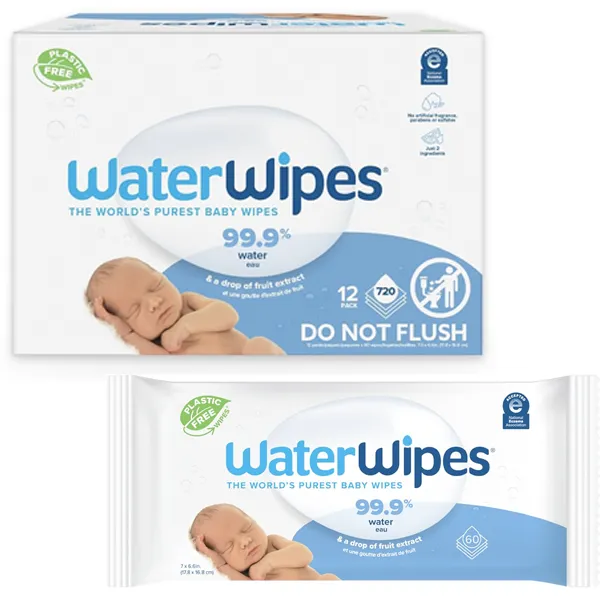
WaterWipes Original Baby Wipes
Made with 99.9% purified water and just a drop of fruit extract, these wipes are about as simple and clean as it gets. They’re often used in hospital NICUs and are a favorite for newborns with extra-sensitive skin.
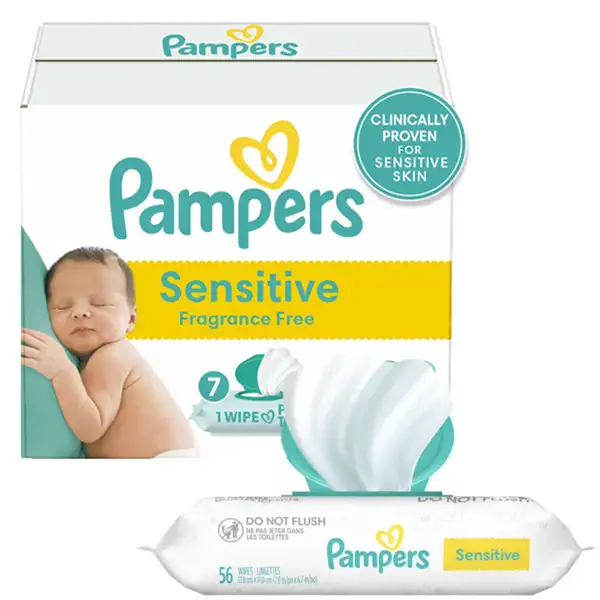
Pampers Sensitive Baby Wipes
Fragrance-free, pH-balanced, and clinically proven to be gentle on newborn skin. These wipes are accepted by the Skin Health Alliance and are easy to find in most stores.
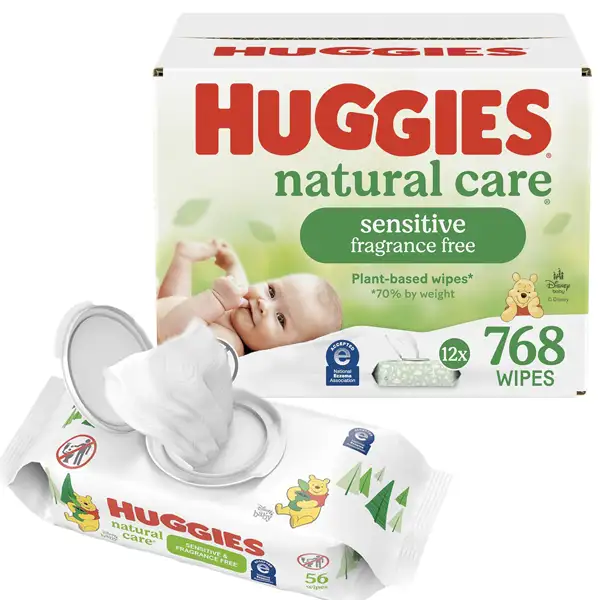
Huggies Natural Care Sensitive Wipes
Plant-based, hypoallergenic wipes with no harsh ingredients like parabens or alcohol. Dermatologist-tested and trusted by many hospitals across the U.S.
? See our full product roundup here: Best Baby Wipes for Newborns (2025) – tested, trusted, and gentle for first-day use.
❌ Ingredients to Avoid
Avoid baby wipes that contain the following (especially in the first few weeks):
1. Artificial Fragrance
Artificial fragrances are made from multiple synthetic chemicals to create a scent. These can trigger allergies or irritate your baby’s sensitive skin, especially in the newborn stage.
2. Alcohol
Alcohol is sometimes added to help wipes dry faster or feel “clean,” but it can strip natural oils, leaving newborn skin dry, irritated, or even cracked.
3. Parabens
Parabens are preservatives used to extend shelf life. They’re now avoided in many baby wipes because of concerns they may interfere with the body’s hormone system.
4. Phenoxyethanol
Phenoxyethanol is a preservative still found in some wipes. While considered safe in small amounts, it can irritate very sensitive or newborn skin, so it’s best to skip it early on.
5. Harsh preservatives or dyes
Strong preservatives and artificial dyes aren’t needed in baby wipes. They can cause redness, irritation, or even staining—less is definitely more when it comes to your baby’s skin.
6. Methylisothiazolinone (MI)
MI is a preservative known to cause allergic reactions and rashes. It’s been banned or removed from most trusted baby wipes but may still appear in lower-cost or older products.
? Even so-called “gentle” wipes may contain these, so it’s important to read the label, not just the front packaging. Here’s an example of a baby wipe label listing Phenoxyethanol—a preservative that can irritate very sensitive newborn skin:
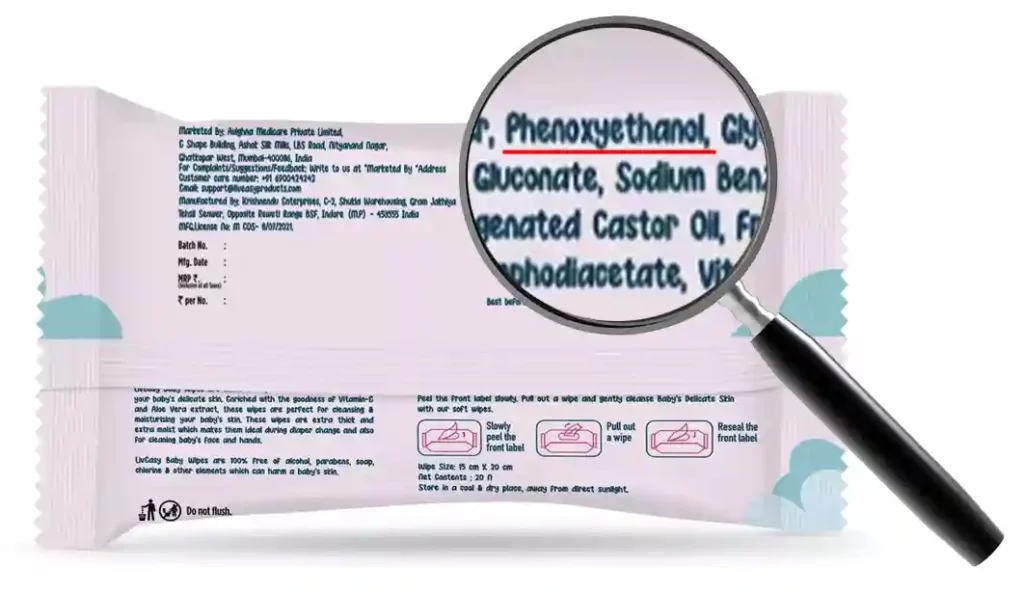
Final Tips for Safe Use of Baby Wipes
- Change diapers frequently to avoid prolonged contact with moisture, which can lead to rashes.
- Gently pat the skin dry instead of rubbing, especially if it’s already irritated.
- Always seal the wipes package tightly to prevent them from drying out or getting contaminated.
- Warm them up in colder months using a wipe warmer or your hands for added comfort.
- Test new wipes on a small area (like the baby’s thigh or arm) before full use, especially if your baby has very sensitive skin or a history of allergies.
- Avoid using wipes on broken or very inflamed skin. Instead, gently rinse with lukewarm water and pat dry.
- Keep an eye on ingredients, even with trusted brands, as formulas can change over time.
- Look for certifications like the National Eczema Association Seal if your baby has eczema or extra-sensitive skin.
Bottom Line: Are Baby Wipes Safe for Newborns?
Yes, baby wipes can be a safe and helpful part of your newborn care routine, as long as you choose the right kind. Fragrance-free, water-based wipes with simple, gentle ingredients are the best bet for keeping your baby clean without irritation.
Remember, your baby’s skin is still adjusting to the world. A little extra care, such as checking labels, doing a quick patch test, and avoiding known irritants, can go a long way. When used thoughtfully, baby wipes offer convenience and comfort for both you and your little one.
And of course, if you ever notice redness, rashes, or other signs of irritation, it’s always smart to pause use and check in with your pediatrician.
